
Page 20 — Part One — ISLAM
Page 43 — Part Two — CANCER BLOG
Page 207 — Part Three — HOW TO WRITE
Page 259 — Part Four — STORIES
Page 312 — Part Five — POEMS
Page 353 — Part Six — DEATH POEMS
Page 383 — Part Seven —.WRAPPING UP MY LIFE
In revising my book THIS IS A PICTURE OF YOUR GOD: A HUGH COOK READER, the contents of which are indicated above, I added a tailend piece called BURN IN HELL YOU BASTARDS, which features the passage below, which is a synthesis of a couple of pieces I wrote in May 2006 plus a little additional new material.
The nominal date of 19 May has been given to this piece, as shown below.
Friday 19 May 2006
Brain damage I was warned about. I should expect, quite possibly, short term memory loss. If so, then I would have to live with it.
This I can cope with.
When seeking directions in Tokyo's crowded Shibuya district, I was asking for the music store HMV but ended up asking where I could find HIV. No problem. The store is a major landmark, and the guy I was talking to figured out my meaning.
Recently, when renewing my card at the local library, I was convinced that the librarian had retained my car. It turned out, however, to be in my wallet.
This kind of minor glitch is not disabling. If that's the price, then, okay, I was warned.
But the blindness which has come upon me, this, the heartbreaking tragedy which has shattered my life, of this I had no warning. And I believe that I inquired specifically into this danger, and that I was denied the knowledge that, by rights, I should have been given.
If there is a hell, then I most sincerely hope that my radiation oncologists end up burning in it.
Meantime, the reality is that I am partly blind and quite possibly heading in the direction of being totally blind. It is possible that I am already legally blind.
Which brings us to today's question: what does legally blind mean?
A reader sent an angry letter to a New Zealand newspaper denouncing a customer who had been seen in a supermarket with a dog. The dog was a guide dog, but the woman was plainly not blind, since she was peering at groceries on the shelves.
Someone wrote in to explain that people who are visually disabled may fit into a "legally blind" category which does not necessarily mean being stone blind. The woman seen in the supermarket might quite possibly have been able to see the groceries at close range, yet need the guide dog for survival on the busy streets.
The situation is, I believe, similar in America, New Zealand and Japan. People who are visually disabled may fit into a "legally blind" category if they satisfy one of two requirements:
(a) They can only read very large print; or
(b) Their visual field has failed to a stated extent.
I do not know whether I, personally, fit into the Japanese category of "legally blind", as the eye specialist who will interpret the result of my recent visual field test has not yet delivered his analysis.
But, regardless of the technicalities, it is possible that my eyesight will deteriorate, in the left eye, to a state of near-total blindness, just as it has in the right eye.
This uncertainty is, to put it mildly, disconcerting.
I was grateful to receive an encouraging comment from a reader, Melvin, who wrote, in part:
"I hope that life still has more than enough things to enjoy and experience, and unfinished business to pursue, that it never becomes tiresome."
In that spirit, my intention is to push ahead with further projects, to the extent to which that is practical, the latest being a new edition of my science fiction book THE SHIFT, out of print since 1986.
For practical purposes, I have two problems:
1. Things I see which do not really exist, and
2. Things which do exist but which I fail to see.
The latest sumo tournament is in full swing and, while watching TV, I saw a very formal ceremony in which, to my eyes, one of the sumo wrestlers appeared to be wearing a black bra. I knew that this was impossible so dismissed the vision.
On the other hand, there was the incident of the draining board.
It is made of two pieces of plastic, and water drains through into the lower compartment, so it is my habit to pick it up and empty out the water.
Recently I did this and a drinking glass, which was invisible to me, went crashing into the sink and smashed.
The next day, I looked very carefully and, before reaching for the draining board, checked to make sure it was empty. There was nothing there.
Then I swept my hand through the "empty" space and found, perched on the edge of the draining board, a while plastic bread board sitting (invisibly, as far as I was concerned) against the white paint of the kitchen wall.
In the brightness of the day, I need sunglasses. That's no problem. In a dimly-lit room, however, I am blind.
The day I recently went to a noodle restaurant with my wife, I opted to sit outside rather than inside because I could not see in the murky gloom of the interior.
Even outside in the bright sunshine I could not see properly, and confidently poured soy sauce onto the surface of the table when I thought I was adding it to a small dish of condiments.
Still, at this stage I can still work reasonably effectively using my computer, as the easiest thing for me to see is black print on an illuminated screen.
I am, then, not totally blind, not at this stage, though, subjectively, it seems to me that my remaining eyesight is deteriorating at an alarming rate.
And am I legally blind by Japanese standards?
Well, a local eye specialist's analysis of my recent visual field test will supply an answer to that.
Earlier, back in January, I wrote about a visual field test that I had done on both eyes in Auckland, New Zealand.
At that time, the result indicated a loss of vision in the upper right hand quadrant of each eye and, additionally, some loss of the central vision in the right eye. My ophthalmologist agreed with the notion that this eye damage was caused, in all probability, by the radiation therapy I was subjected to back in 2004.
This time, no test was done on the right eye because the right eye is now blind and useless.
The latest visual field test shows the white area as being those in which I see and the dark areas as being those that I do not see.
The test was the same in Japan as in New Zealand, but for two points.
For a visual field test, you stare at a fixed point on a screen, without chasing any flashing lights you might see, and you click a button every time you see a flashing white light.
A computer generates an image showing the result, as pictured above.
The first difference was that, in Japan, before the test began, they displayed, on the screen, four orange lights, which made a diamond pattern on the screen. They told me to watch for a flashing white light in the center of the diamond, which I did.
In other words, the first significant difference was that you got to see the flashing white light before you started looking for it. You were shown an example of exactly what you were looking for.
The second difference was that they told me about how long it would take -- ten minutes or so. The first time, I was given no guidance on timing, and, subjectively, I thought the test was about half an hour ago.
Additionally, when I did the visual field test in New Zealand, another person was already hard at work in the same room doing such a test, and so the person supervising the test was reluctant to answer my questions.
That said, the test was essentially the same.
I noticed that some of the flashing lights were much brighter than others, which I assume is because part of the eye was more damaged than other parts.
Before undergoing radiation therapy in New Zealand, I asked my radiation oncologists about the possibility of eye damage, and was told that I could expect the development of cataracts in a few years, because radiation grazing the backs of the lenses would cause the development of cataracts.
Cataracts, however, are not a big deal, as they can be surgically managed, and I received cataract surgery on both eyes last year, in 2005. The surgery was successful and, in the wake of that success, nothing prepared me for the disaster which was coming.
If I had been told that the radiation would result in blindness then I would not have opted for the radiation. I would, rather, have taken my chance.
I asked my radiation oncologists about this particular point, the risk of damage to the eyes, and I was not adequately informed.
As far as I am concerned, I was lied to. My life was destroyed by a decision made by doctors who did not adequately inform me about a point on which I raised the specific issue.
Burn in hell, you bastards.
 Drawing a dangomushi.
Drawing a dangomushi.
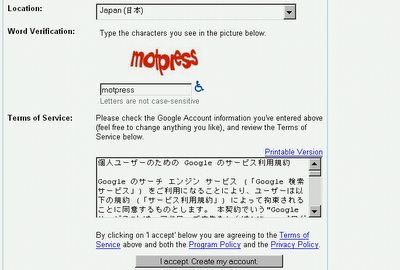
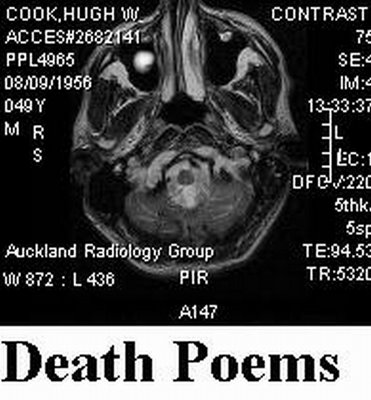 I have now published a set of death poems at:
I have now published a set of death poems at:

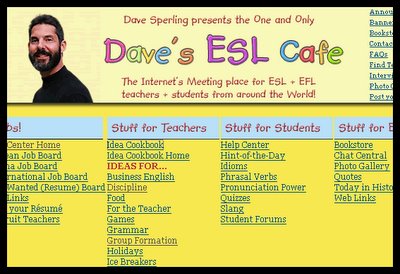 My early explorations of English teaching material on the Internet seem to be confirming my first impressions, which is that the web is awash with resources.
My early explorations of English teaching material on the Internet seem to be confirming my first impressions, which is that the web is awash with resources.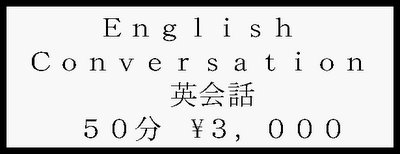 Thursday 1 June 2006 I bought online a download of Norton Antivirus 2005, which was a major hassle.
Thursday 1 June 2006 I bought online a download of Norton Antivirus 2005, which was a major hassle.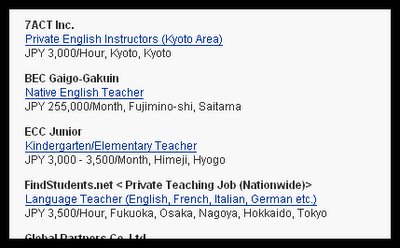 Teaching English in Japan: my own private students.
Teaching English in Japan: my own private students.